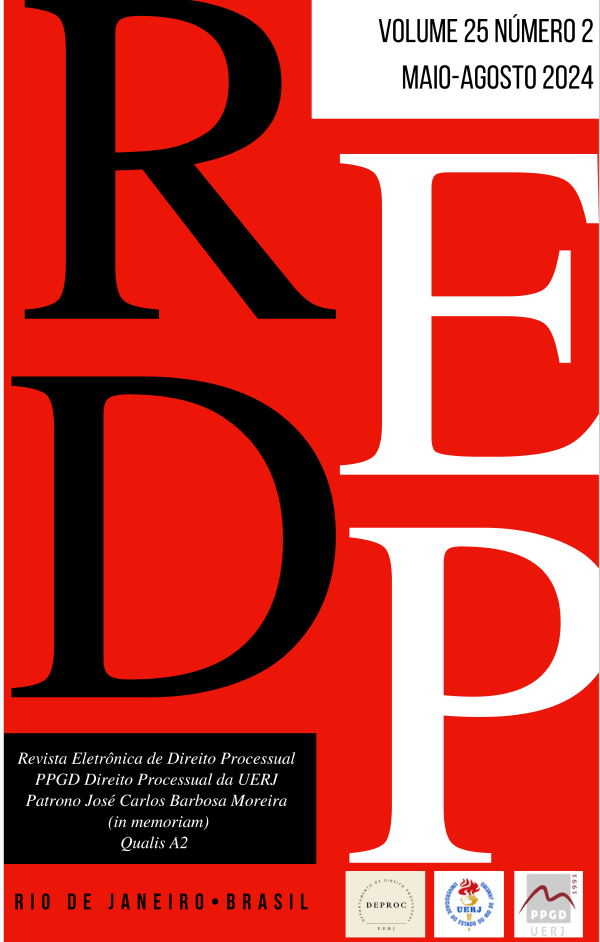A (DES)NECESSIDADE DE UMA LEI DE ARBITRAGEM ADMINISTRATIVA NO ORDENAMENTO JURÍDICO PORTUGUÊS - O ESTADO DE ARTE
DOI:
https://doi.org/10.12957/redp.2024.85247Abstract
In view of the increasing slowness of state justice, insufficient technical and human resources and growing specialization of the matters subject to disputes, in administrative law matters, combined with the advantages inherent to alternative means of resolving disputes, especially arbitration, there is a growing resource to this alternative dispute resolution mechanism. In the Portuguese legal system, the legislation governing administrative arbitration is spread across several diplomas. The institute finds regulation in the Voluntary Arbitration Law, henceforth LAV, a diploma designed and configured for civil and commercial arbitration, which applies in addition to administrative arbitration, particularly with regard to the organization and functioning of arbitration courts. The matter of administrative arbitration is also regulated, in its fundamental aspects, in the CPTA, of arts. 180º to 187º, in the Public Contracts Code (art. 476 of the CCP) and in the legal regime of tax arbitration, by remission of art. 181º nº4 of the CPTA. Given the lack of a single normative source regulating administrative arbitration, we are faced with the application of solutions specific to private arbitration to Administrative Law arbitration, which are not in line with the principles applicable in the context of this branch of Law. In addition, there are marked inconsistencies between the different solutions provided for in the different diplomas. In this text, we propose to analyze the current solutions in some matters, identifying the main application problems, gaps, as well as some issues that require specific treatment from an administrative legal point of view, concluding that there is a possible need for a voluntary arbitration law administrative.
Downloads
Published
How to Cite
Issue
Section
License
Copyright (c) 2024 Bárbara Magalhães

This work is licensed under a Creative Commons Attribution 4.0 International License.
Todos os artigos publicados na Revista Eletrônica de Direito Processual (REDP) (Departamento de Direito Processual, Universidade do Estado do Rio de Janeiro, Brasil) são licenciados por meio de uma Licença Creative Commons - Atribuição 4.0 Internacional (CC BY 4.0).
Os autores retêm os direitos autorais de seu artigo e concordam em licenciar seu trabalho com a licença CC BY 4.0, aceitando assim os termos e condições específicos desta licença disponíveis no seguinte website: https://creativecommons.org/licenses/by/4.0/legalcode.
- Os autores concedem à REDP o direito de primeira publicação, de se identificar como publicadora original do trabalho e concedem à revista uma licença de direitos não exclusivos para utilizar o trabalho das seguintes formas: Reproduzir, vender e distribuir cópias eletrônicas ou impressas do manuscrito como um todo, de partes específicas do manuscrito e de suas traduções para qualquer idioma;
- O uso do artigo por terceiros é livre, contanto que a integridade da publicação seja mantida e seus autores originais, periódico de primeira publicação e detalhes de citação sejam identificados.
Dentro dos termos da licença, os autores podem entrar em acordos contratuais adicionais separados para a distribuição não exclusiva da versão publicada do trabalho na revista.
Copyright and Licensing
All articles published in the Procedural Law Electronic Review (REDP) (Department of Procedural Law, State University of Rio de Janeiro, Brazil) are licensed under a Creative Commons License - Attribution 4.0 International (CC BY 4.0).
- Authors retain copyright to their article and agree to license their work under the CC BY 4.0 license, thereby accepting the specific terms and conditions of this license available at the following website: https://creativecommons.org/licenses/by/4.0/ legal code.
- Authors grant REDP the right of first publication, to identify itself as the original publisher of the work, and grant the journal a non-exclusive license to use the work in the following ways: Reproduce, sell and distribute electronic or printed copies of the manuscript as a whole, of specific parts of the manuscript and its translations into any language;
- Use of the article by third parties is free, as long as the integrity of the publication is maintained and its original authors, first publication journal, and citation details are identified.
Within the terms of the license, authors may enter into separate additional contractual agreements for the non-exclusive distribution of the published version of the work in the journal.




